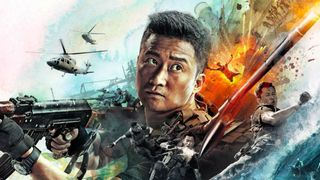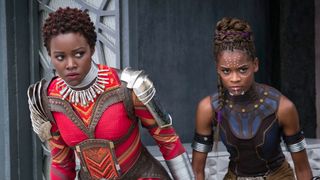Cultural milestones generally are best observed at a distance. On occasion, some of the great works of art are overlooked or dismissed, with the early conclusions being overtaken by the passage of time. Think for a moment of the initial reaction to George Orwell’s Homage to Catalonia or Jack Kerouac’s On The Road. Even better, Mark Twain’s The Adventures of Huckleberry Finn had little impact when it was first published. Remember, this is the novel that Ernest Hemingway maintained set the benchmark for all American novels that followed.
The same ignorance is equally true of movies, from The Wizard of Oz to Blade Runner. Recognised now as classics, they fell well short of the attention they deserved when they first appeared on the screen. The same cannot be said of two present films — one Chinese and one American — which have not only blitzed their respective box offices but have had a deep and probably enduring impact on the cultures of the two countries.
Wolf Warrior II is the most popular film in the history of the Chinese cinema, having taken more than $800 million. Black Panther, by comparison, has achieved more than $1 billion. In so doing, it has reset American expectations of Hollywood.
Both films are set in Africa but the similarity does not end there.
WWII is a tale of a disgraced Chinese special forces officer, living in enforced retirement in a mythical African state that is engulfed in civil war.

The adversaries, who are as convincing as comic book villains, are of various nationalities: American and European. They are brutal mercenaries in control of a brutal mercenary army. WWII has emerged from the Chinese martial arts culture that has produced an endless stream of action movies, where plot is secondary to spectacular and violent confrontations. There is plenty of the physical but the political message that underlies the movie is both consistent and unmistakeable.
Black Panther, of course, emerges from the empire created by Stan “The Man” Lee and Jack “King” Kirby, Marvel Comics. From Captain America to The Avengers, Marvel has always produced superheroes who have fought villains threatening the American heartland, be it a Nazi like the Red Skull or Loki, Thor’s malevolent half-brother. Black Panther is different in one critical way. He is an African ruler of a kingdom called Wakanda that has advanced technologically but remains benign and committed to maintaining the peace, despite its hard power.
For Chinese audiences, WWII is an expression of China’s arrival as a global, not merely a regional, power. Xi Jinping’s speech to the 19th party conference in Beijing last November made this irredeemably clear. Chinese aspirations are to be a primary, global player anywhere in the world, including Africa.
During the course of the Arab Spring, China was embarrassed that its citizens had to be evacuated from turmoil in disintegrating countries such as Libya by Western navies and Western maritime capability. The establishment of the People’s Liberation Army base at Djibouti, alongside the Americans and the French, and perhaps the Saudis in the near future, was Beijing’s response.
The young director of Black Panther, Ryan Coogler, first came to prominence with the movie Fruitvale Station about his home town, Oakland, California. Fruitvale Station was an account of the killing of an unarmed young black man by a cop. Oakland is integral to the narrative of the Black Panther movie, where certain crucial scenes occur. The unstated irony is that Oakland was the original home of the militant 1960s political group the Black Panther Party.
Given the extraordinary success of Coogler’s movie, America now seems more than comfortable with a movie in which a black actor, Chadwick Boseman, is the central and dominant superhero. In this film, a black director establishes new and original norms whereby an African society, which has escaped colonialism by stealth, has much to teach the rest of the world.

Wu Jing, originally a martial arts star, is the director and central character of WWII. He also has crafted a movie that eschews colonialism. Repeatedly during the film, the Chinese ambassador or admiral assert that China is a friend of Africa and is there only as a co-operative contributor to local wellbeing. Indeed, even when Chinese citizens are being threatened by insurgents, the Chinese military refuses to intervene without a UN mandate.
An American doctor, played by Celina Jade, attempts to secure American assistance only to discover that the US consulate has closed and the American republic is nowhere to be found. This manner of subtlety characterises WWII. It is easy to dismiss the film as merely being Rambo with Chinese characteristics. In some respects it is. But there is a much larger political point being made. We are no longer witnessing the China of unequal treaties, Opium Wars and imperial concessions. This is a very confident China, determined to make its mark and to challenge an existing order by virtue of its newly forged strategic reach. Wolf Warrior III, which will appear next year, will doubtless continue this advocacy.
Black Panther is also reaching out. But it is an America that is reaching out to itself to embrace an entirely new generation of African-American actors and filmmakers as being players of critical consequence in their film culture.
True, there have been other black superheroes such as Blade and Shaft, but nothing approaches Black Panther, underpinned by the Marvel Cinematic Universe in impact. The Marvel superheroes have indeed arrived.
WWII is a clear and undiluted expression of the China Dream that is now openly canvassed in Chinese politics.
Black Panther reflects the dramatic shift that has occurred in the American Dream.
Both these movies are milestones and say much about contemporary China and the US. The final scene in WWII features a Chinese passport accompanied by a powerful declaration that the Chinese state protects its citizens. By contrast, the final scene in Oakland suggests that Black Panther has insight into a pathway for a better American future.





